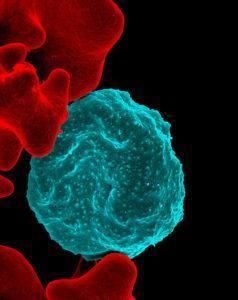
Colorized scanning electron micrograph of red blood cell infected with malaria parasites (NIAID, Wikimedia Commons)
Regulatory T cells (Tregs) are important in the control of the immune response. Anti-cytotoxic T-lymphocyte-associated antigen-4 (CTLA-4) is a checkpoint protein that downregulates the immune responses. Researchers from the University of Iowa Carver College of Medicine have now found that Tregs suppress the immune response against blood-stage malaria. The mechanism the Tregs use for this immune suppression is through CTLA-4 and results in delayed parasitic clearance and development of an inefficient response to fight off re-infection.
Tregs are a subset of CD4+ T helper cells which play an important regulatory role in the immune response to infection. In most instances, upon activation of the adaptive immune system in response to infection, T helper cell numbers increase to help B cells produce antibodies. A subset of these cells then form the memory response to protect from re-infection. However, in malaria infection after a period of time the conventional T helper cell populations stop expanding and at this time, the researchers found that the Treg population increased. Elimination of these Tregs in an infected mouse model led to the conventional T helper cell populations continuing to expand and the mice cleared the malaria infection due to a robust immune response.
The team then showed that Tregs suppress the immune response against malaria by expressing CTLA-4. When CTLA-4 (also known as CD152) bind to CD80 or CD86 in antigen-presenting cells, it inhibits their function, leading to a reduced immune response. The researchers found that CTLA-4 interferes with the functioning of T follicular helper cells which are important in providing help to B cells in producing antibodies against malaria infection.
Altogether, this study shows how Tregs suppress the immune responses against the malaria parasite and lead to the ineffective clearance of the parasite. The study also found that this suppression by Tregs leads to an inhibition of the development of long-term immunity towards re-infection by the malaria parasite. Therapeutic targeting of Tregs or CTLA-4 may lead to more efficient parasite clearance and generation of sufficient memory to fight off malaria infection.
Journal article: Kurup et al., 2017.Regulatory T cells impede acute and long-term immunity to blood-stage malaria through CTLA-4. Nature Medicine
Article by Thandeka Moyo











